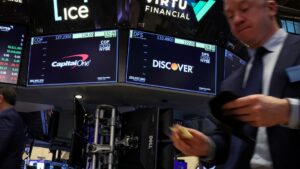Capital One’s $35 Billion Deal with Discover Financial: What You Need to Know
In a significant move for the banking industry, Capital One has received the green light from banking regulators for its $35 billion acquisition of Discover Financial. This deal isn’t just a massive transaction; analysts believe it could reshape the financial landscape and bring valuable opportunities to investors. At Extreme Investor Network, we aim to dissect what this means for you and why it’s a pivotal moment in the financial sector.
The Ripple Effects of Regulatory Approval
This approval from the Federal Reserve and the Office of the Comptroller of the Currency signals a shift toward a more favorable regulatory environment, particularly under the current administration. Researchers at Wells Fargo noted that the easing of regulatory scrutiny is not just a win for Capital One but a promising signal for investment banking activity across major U.S. banks. As we progress into 2025, this could potentially lay the groundwork for increased mergers & acquisitions (M&A) and public offerings—a positive shift for the market’s overall health.
Capital One’s Earnings Potential
Analysts regard the merger as more than a mere expansion of Capital One’s portfolio; they emphasize that this acquisition will likely bolster Capital One’s earnings potential significantly. With the Discover acquisition, Capital One will now own a robust payment network and reduce its dependence on industry giants like Mastercard and Visa. This independence can cushion the company against the unpredictable macroeconomic scenarios that often plague financial institutions.
Importantly, Wells Fargo has maintained a “buy” equivalent rating on Capital One stock, indicating strong belief in its upward trajectory. The anticipated closing date for the deal is May 18, and it’s poised to enhance earnings growth long-term.
Implications for Other Financial Institutions
The effects of this merger extend beyond just Capital One. Other investment banks like Goldman Sachs stand to benefit from a more lenient regulatory framework, creating more opportunities for advisory services and IPO underwriting. However, there remains palpable concern regarding economic uncertainties, particularly concerning the recent tariffs and recession fears affecting market confidence.
Goldman Sachs CEO David Solomon has pointed to a different operating environment as we enter the second quarter, reflecting the cautious mood of corporate clients. The market’s volatility has certainly affected investment banking revenues; hence recognizing new opportunities for business growth—such as those offered by the Capital One-Discover merger—is critical.
Profiling Wells Fargo’s Potential Growth
Wells Fargo also appears to be on the brink of expansion, attempting to persuade the Fed to lift the asset cap imposed on the bank due to past misdeeds. The leadership under CEO Charlie Scharf is cleaning up the bank’s image, setting it up for a stronger future. Removing this cap would not only allow the bank to expand its services but could also enhance its fee-based business areas, reducing reliance on interest income.
What This Means for Investors
As investors, aligning your portfolio with these emerging trends is crucial. The Capital One-Discover merger represents a pivotal moment in the banking industry, potentially indicating more consolidation and growth opportunities. The analyst community remains optimistic, particularly as the regulatory landscape becomes clearer.
At Extreme Investor Network, we’re committed to providing you with not just the news but also actionable insights about where the financial markets are headed. We urge our readers to keep an eye on these developments—as they present potential investment opportunities that could benefit your financial strategy.
In conclusion, the Capital One acquisition of Discover Financial is not merely a corporate event; it symbolizes a potential reshaping of the financial sector. With favorable regulatory conditions, expanded earnings potential, and growth opportunities across multiple institutions, the future appears promising. Stay informed, stay invested—and remember to keep checking back with us at the Extreme Investor Network for the latest insights and strategies to enhance your investment decisions.

